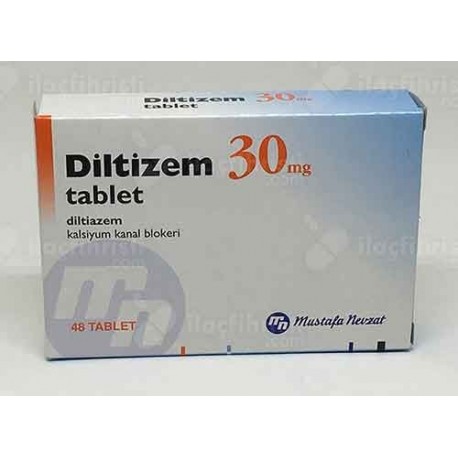Diltizem Diltiazem Hcl ( Cardizem,matzim,zemtard) 48 Tablets
New product
BUY MORE PAY LESS
| Quantity | Discount | |
|---|---|---|
| 2 | 5% | |
| 3 | 10% | |
| 4 | 15% | |
| 5 | 20% |
Volume discounts
| Quantity | Discount | You Save |
|---|---|---|
| 2 | 5% | Up to $2.90 |
| 3 | 10% | Up to $8.70 |
| 4 | 15% | Up to $17.40 |
| 5 | 20% | Up to $29.00 |
More info
4. CLINICAL FEATURES
4.1. Therapeutic indications
It is indicated in the prevention and long-term treatment of angina pectoris. It is not indicated in acute angina attacks.
It is indicated in mild to moderate arterial hypertension.
4.2. Posology and method of administration
Posology / application frequency and duration:
The dose of DILTIZEM tablet is adjusted according to the patient and the severity of the disease.
Adults:
In the treatment of angina, the starting dose is 30 mg tablets three or four times a day. In the treatment of hypertension, the starting dose is 60-120 mg twice a day. If necessary, the dose can be gradually increased to 120 mg twice a day or 180 mg twice a day. Especially in some patients with unstable angina, benefit has been achieved at doses up to 480 mg / day.
Method of Application:
It is for oral use.
The tablets should be swallowed whole with a little water on an empty stomach without breaking or chewing.
Additional information on special populations Renal / Liver failure and geriatric population:
The starting dose is 60 mg diltiazem twice a day. If necessary, the dose may be gradually increased, but careful monitoring of patients is recommended. In patients taking 120 mg, the dose can be increased to 240 mg once a day.
Pediatric population:
It is not recommended for use in children and adolescents.
4.3. Contraindications
DILTIZEM is contraindicated in the following situations:
• In patients who are hypersensitive to diltiazeme and any of the excipients it contains,
In sick sinus syndrome cases where ventricular pacemaker is not used,
Patients with second or third degree AV block without ventricular pacemaker.
In severe hypotension (in patients with systolic blood pressure less than 90 mmHg).
In patients with acute myocardial infarction and pulmonary congestion,
• During pregnancy, those with childbearing potential,
Congestive heart failure,
In severe bradycardia (below 40 bpm),
In severe aortic stenosis,
• When used with Dantrolene infusion (See Section 4.5),
• Patients with intravenous forms of cardiogenic shock, patients with ventricular tachycardia, atrial fibrillation or atrial flutter caused by an additional conduction path such as WPW syndrome or short PR syndrome.
4.4. Special use warnings and precautions
• Cardiac conduction: Close monitoring is required in patients with reduced left ventricular function, bradycardia (risk of exacerbation), prolonged PR interval or first degree AV block on electrocardiogram (exacerbation and rarely risk of complete block).
Diltiazem lengthens the AV nodal conduction and refractory period at the AV node. This effect may rarely result in second or third degree AV block in sinus rhythm. Co-administration of diltiazem with drugs known to affect cardiac conduction may result in additive effects.
Congestive heart failure: Although diltiazem has a negative inotropic effect in isolated animal tissue preparations, in humans with normal ventricular function and in patients with compromised myocardium (such as severe CHF, acute MI and hypertrophic cardiomyopathy) there is a decrease in the cardiac index and correspondingly contractility ( There were no negative effects on dp / dt).
Since experience with diltiazem alone or in combination with other beta-blockers in patients with ventricular dysfunction is limited, caution should be exercised in such patients.
• Hypotension: Drops in blood pressure due to diltiazem can sometimes cause symptomatic hypotension.
• Acute liver injury: On rare occasions, significant increases in enzymes such as alkaline phosphatase, LDH, SGOT and SGPT and some other events consistent with acute liver injury have been reported after administration. These reactions were reversible upon discontinuation of the drug.
• Renal or hepatic insufficiency: Increased plasma concentrations of diltiazem may be observed in patients with renal or hepatic impairment and in the elderly. Contraindications and precautions should be carefully monitored, especially heartbeat should be monitored from the beginning of treatment.
Diltiazem is metabolized in the liver and excreted through the kidneys and bile. Therefore, diltiazem should be used with caution in patients with renal or hepatic insufficiency.
Dermatological events: Dermatological events can be temporary and disappear even with continued use of diltiazem. However, some dermatological reactions including erythema multiforme and / or exfoliative dermatitis have been reported. If dermatological reactions persist, drug administration should be stopped.
Diltiazem is considered to be unsafe in patients with acute porphyria.
• Before general anesthesia, the anesthesiologist should be informed about the ongoing diltiazem treatment.
• Calcium channel blocking agents such as diltiazem can be associated with mood disorders, including depression.



